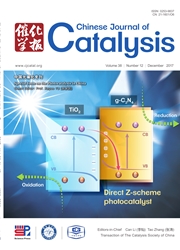

 中文摘要:
中文摘要:
生物柴油是一种环境友好的燃料,随着其生产及应用的快速增长,其生产过程中重要的副产物甘油将会大量过剩.因此,将甘油转化为高附加值的化学品对于提高生物柴油整体竞争力具有重大意义.乳酸是重要的化工原料,可用于制备生物兼容和可降解的聚乳酸塑料,广泛应用于食品和医药等领域.近年来,由甘油制乳酸的研究受到格外关注,相对于水热反应和氢解反应等,催化选择氧化反应因温和的反应条件而更具竞争力. 目前,甘油催化选择氧化制乳酸一般需加入较高比例的NaOH,而碱的类型对反应性能的影响鲜有报道.另外,催化剂常采用TiO2和CeO2等氧化物载体,而炭载体具有比表面积较大、在酸碱溶液中稳定及贵金属易于回收等优点,在催化领域有着广泛应用.因此,本文研究了活性炭(AC)担载的Pt催化剂在甘油催化选择氧化制乳酸反应中的催化性能. 首先研究了Pt/AC催化剂和碱在甘油催化选择氧化制乳酸过程中的催化作用.实验发现, Pt/AC和碱协同作用才能得到乳酸. Pt/AC催化剂在甘油脱氢生成中间产物(甘油醛和二羟基丙酮)的过程中起主导作用,碱的存在能够促进甘油羟基脱氢;中间产物实验证实,中间产物生成乳酸过程中碱起主导作用,它促进甘油醛和二羟基丙酮脱水反应和坎尼扎罗重排反应获得乳酸.进一步研究发现,中间产物二羟基丙酮比甘油醛更有利于乳酸生成,而Pt/AC催化剂有利于中间产物氧化为甘油酸. 进一步研究了不同类型的碱对反应性能的影响.结果表明,碱金属氢氧化物(LiOH, NaOH, KOH)比碱土金属氢氧化物(Ba(OH)2)更有利于提高甘油转化率和乳酸选择性.在加入碱金属氢氧化物条件下,甘油转化率与其离子半径呈正相关,而乳酸选择性则呈相反趋势.在LiOH存在下,乳酸选择性明显高于NaOH和KOH条件.当LiOH:甘油摩尔比为1.5时,甘油转化率和乳
 英文摘要:
英文摘要:
Pt/activated carbon (Pt/AC) catalyst combined with base works efficiently for lactic acid production from glycerol under mild conditions. Base type (LiOH, NaOH, KOH, or Ba(OH)2) and base/glycerol molar ratio significantly affected the catalytic performance. The corresponding lactic acid selectivity was in the order of LiOH〉NaOH〉KOH〉Ba(OH)2. An increase in LiOH/glycerol molar ratio ele‐vated the glycerol conversion and lactic acid selectivity to some degree, but excess LiOH inhibited the transformation of glycerol to lactic acid. In the presence of Pt/AC catalyst, the maximum selec‐tivity of lactic acid was 69.3% at a glycerol conversion of 100% after 6 h at 90 °C, with a Li‐OH/glycerol molar ratio of 1.5. The Pt/AC catalyst was recycled five times and was found to exhibit slightly decreased glycerol conversion and stable lactic acid selectivity. In addition, the experimental results indicated that reaction intermediate dihydroxyacetone was more favorable as the starting reagent for lactic acid formation than glyceraldehyde. However, the Pt/AC catalyst had adverse effects on the intermediate transformation to lactic acid, because it favored the catalytic oxidation of them to glyceric acid.
 同期刊论文项目
同期刊论文项目
 同项目期刊论文
同项目期刊论文
 期刊信息
期刊信息
